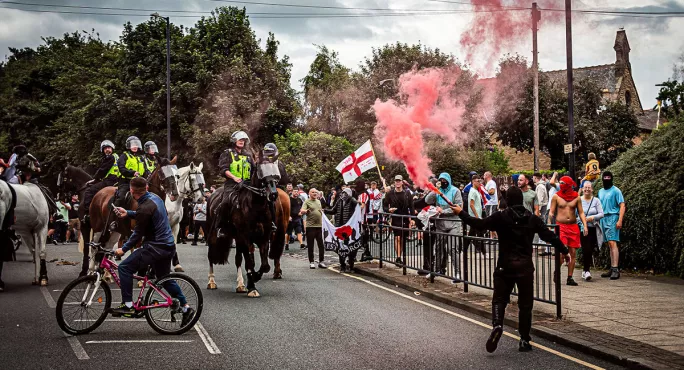Schools ‘need crucial guidance’ after summer riots

Schools need ‘”crucial” guidance on responding to tensions following the riots earlier this month, governance leaders have told the government as staff prepare to return next week after the summer break.
The warning comes amid growing concerns among heads and teaching leaders about the lack of advice before the start of the new academic year, with fears that schools will be “left alone” to deal with the aftermath of the riots. Scores of young people of school age have been charged with criminal offences over the rioting.
The country saw days of disorder and violence earlier this month following the fatal stabbings of three girls at a Taylor Swift-themed holiday club in Southport on 29 July.
An 11-year-old boy from Middlesbrough is believed to be the youngest person arrested over the widespread disorder.
School fears over riots tension
Sam Henson, deputy chief executive of the National Governance Association, called for the Department for Education to “act swiftly to help tackle the very real risk of division entering the school gates” and provide “practical, easy-to-use guidance for school leaders and governing boards” on how to respond to tensions.
As of writing, the DfE is yet to publish guidance on how schools can support students and teachers in the wake of recent violence.
“This clear direction is crucial,” Mr Henson said, adding that governors also need advice on how to build long-term strategies and whether to review existing safeguarding and health and safety plans.
- UK riots: Convene “urgent” teacher working group, government told
- New school year: How to set behaviour intentions
- Behaviour: Empathy lessons lead to positive behaviour changes, says study
Mr Henson was speaking after the government was urged to convene an “urgent” teacher working group to respond to the violence, as Tes revealed earlier this month.
Dr Patrick Roach, general secretary of NASUWT teaching union, said the union has already voiced concerns to the government about the impact of the riots on safety and security in schools.
“Schools cannot be left alone to deal with the consequences of the violence and thuggery witnessed this summer,” Mr Roach warned.
The union has also asked the government to ensure that extra support is provided to keep staff and pupils safe, fearing that “many pupils, parents and school staff will be anxious about their safety”.
Teachers ‘face tricky conversations’
There also needs to be a focus on how to conduct “tricky conversations” that can be facilitated in a “safe, comfortable space”, according to Mr Henson.
Keziah Featherstone, executive head at The Mercian Trust, which has nine schools in the West Midlands, an area impacted by the street violence earlier this month, echoed the need for support for staff in carrying out sensitive conversations with students.
“The first support that my school will give more directly will be to the teachers on how to talk to students so that teachers know that they are saying, doing and reporting the right things - particularly with less experienced staff,” she said.
At Newman Catholic College in Oldham, headteacher Glyn Potts said that his school is not expecting any issues upon students’ return, but it is “planning as if there will be”.
“Our community will come together on the first couple of days and revisit the riots and the false narrative around them,” Mr Potts said.
Mr Potts called for the return of a community tension report, which schools in Oldham previously received fortnightly and provided intelligence on potential issues in the local area.
“This should be published for all schools, perhaps with regions or cities taking an active role, so schools are better prepared to support students and address any lies on social media,” he added.
Pepe Di’Iasio, general secretary of the Association of School and College Leaders, said the union is unaware of any government plans to issue guidance to schools.
“We would welcome anything that provides practical support without creating additional expectations or workload,” Mr Di’Iasio added.
Schools and colleges already do a great deal of work to promote values such as mutual respect, understanding of those with different faiths and beliefs, and the importance of the rule of law, he said.
The government said it would carry out a rapid review, led by the Home Office, to inform a new counter-extremism strategy in response to the unrest.
The Department for Education has been contacted for comment.
For the latest education news and analysis delivered every weekday morning, sign up for the Tes Daily newsletter
You need a Tes subscription to read this article
Subscribe now to read this article and get other subscriber-only content:
- Unlimited access to all Tes magazine content
- Exclusive subscriber-only stories
- Award-winning email newsletters
Already a subscriber? Log in
You need a subscription to read this article
Subscribe now to read this article and get other subscriber-only content, including:
- Unlimited access to all Tes magazine content
- Exclusive subscriber-only stories
- Award-winning email newsletters



